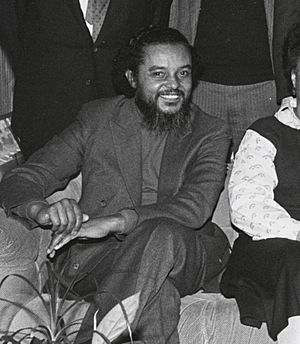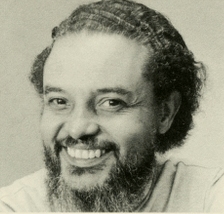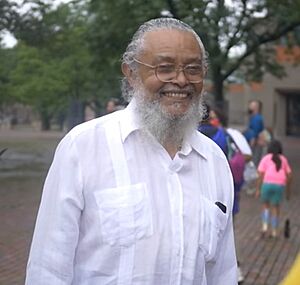Byron Rushing facts for kids
Quick facts for kids
Byron Rushing
|
|
|---|---|
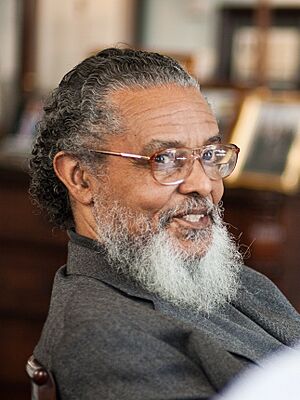
Rushing in 2012
|
|
| Assistant Majority Leader of the Massachusetts House of Representatives | |
| In office December 6, 2011 – January 2, 2019 |
|
| Preceded by | Charles Murphy |
| Succeeded by | Joseph Wagner |
| Second Division Chair of the Massachusetts House of Representatives | |
| In office January 28, 2011 – December 6, 2011 |
|
| Preceded by | Kathi-Anne Reinstein |
| Third Division Chair of the Massachusetts House of Representatives | |
| In office February 12, 2009 – January 28, 2011 |
|
| Second Assistant Majority Leader of the Massachusetts House of Representatives | |
| In office February 7, 2005 – 2009? |
|
| Member of the Massachusetts House of Representatives from the 9th Suffolk district |
|
| In office January 2, 1983 – January 2, 2019 |
|
| Preceded by | Mel King |
| Succeeded by | Jon Santiago |
| Personal details | |
| Born | July 29, 1942 New York City |
| Political party | Democratic |
| Residences | South End, Boston |
| Education | Syracuse Central High School |
| Alma mater | Harvard College Massachusetts Institute of Technology |
| Occupation | Educator, politician |
Byron Rushing (born July 29, 1942) is an American politician who served in the Massachusetts House of Representatives for 36 years, from 1983 to 2019. As a member of the Democratic Party, he represented the South End neighborhood of Boston. He was first elected in 1982 and was a key figure in fighting for civil rights and social justice in Massachusetts.
Contents
Early Life and Education
Byron Rushing was born in New York City on July 29, 1942. His father, William Rushing, was a janitor, and his mother, Linda Turpin, was a seamstress who came from Jamaica. Byron has two older brothers, Lawrence and William.
His family later moved to Syracuse, where he went to Madison Junior High and Syracuse Central High School. After graduating in 1960, he moved to Boston to go to college. He has lived in Boston since 1964. Rushing attended famous schools like Harvard College and the Massachusetts Institute of Technology (MIT). He also has an honorary doctorate degree from the Episcopal Divinity School.
Career as an Activist and Politician
Fighting for Civil Rights
In the 1960s, Rushing was a dedicated activist in the civil rights movement. This was a time when many people worked to end unfair treatment of African Americans. He worked with groups like the Congress of Racial Equality (CORE) and was a community organizer in Boston.
He also helped start one of the first community development corporations (CDCs) in the country. These groups help improve neighborhoods. Rushing was also an early organizer in the Black community against the war in Vietnam.
Preserving Black History
From 1972 to 1985, Rushing was the president of the Museum of African American History in Boston. He led the effort to buy and restore the African Meeting House. This is the oldest Black church building still standing in the United States.
In 1979, he helped create the Boston African American National Historical Site. This made sure that important places in Black history would be protected by the National Park Service. He also stays involved in this work by giving walking tours of historic neighborhoods in Boston.
Work in the Massachusetts Government
In 1983, Rushing began his long career in the Massachusetts House of Representatives. This is part of the state government that makes laws for Massachusetts. He worked on many important laws to protect people's rights and improve their lives.
Some of his major achievements include:
- Protecting Students: He was the main sponsor of a law to stop discrimination in public schools based on who a person loves.
- Fighting for Fairness: He spoke out against the death penalty and supported anti-discrimination laws based on a person's height and weight.
- Global Activism: He helped create a Massachusetts law to protest the government of Burma (now Myanmar) for its human rights record.
- Improving Healthcare: He was a key sponsor of a law that stopped insurance companies from refusing to cover people who already had health problems. He also supported programs to make healthcare safer and more accessible for everyone.
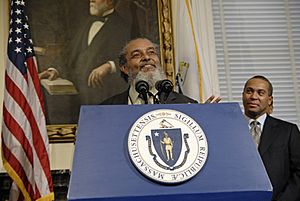
Rushing was also known for his concerns about fairness in law enforcement. He opposed laws that he believed could lead to police unfairly targeting minority drivers.
After serving for 18 terms, he lost his bid for re-election in the Democratic primary election on September 4, 2018, to Jon Santiago.
Personal Life and Community Work
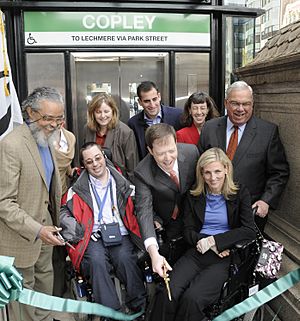
Byron Rushing is married to Frieda Garcia, and they live in Boston's South End. He is an active member of the Episcopal Church and has been a lay deputy (a non-clergy representative) to its national convention since 1973.
He has continued to be a voice for his community. He gives talks on important city issues like gentrification (when a neighborhood changes and becomes more expensive) and city planning. In 2010, Boston's mayor appointed him to the Boston Public Library Board of Trustees to help with the library's budget.
Awards and Recognition
- In 2012, Rushing and his wife, Frieda Garcia, received the Harriet Tubman Community Achievement Award.
- In 2014, he was given the HistoryMaker Award by The History Project for his work in preserving history.
See also
- Timeline of Boston, 1980s–present


